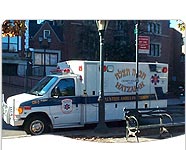 
Patients, Doctors Unaware of CT Radiation Dose
By Will Boggs, MD
NEW YORK (Reuters Health) - How much radiation do you get from
a CT scan?
It's substantially higher than most patients, and even their doctors,
realize, according to a new report.
The radiation dose from one abdominal CT scan has been estimated
to be
equivalent to 100 to 250 chest X-rays, the authors explain in the
May issue
of Radiology. One controversial study has attributed 2500 deaths
annually to
CT examinations in the United States.
Dr. Howard P. Forman and colleagues from Yale University in New
Haven,
Connecticut, surveyed patients, emergency department (ED) physicians,
and
radiologists to determine the awareness level concerning radiation
dose and
possible risks associated with CT scans.
Only 5 of 76 patients (7 percent) reported being informed of the
risks and
benefits before their CT scan, the authors report, and only 10 of
45 ED
physicians (22 percent) reported explaining those risks and benefits
to
their patients.
Nearly half the radiologists (47 percent) believed that a CT scan
increased
the lifetime risk of cancer, the results indicate, but a similar
belief was
reported by only 3 percent of patients and 9 percent of ED physicians.
Ninety-two percent of patients estimated the radiation dose of
one CT scan
to be no more than 10 chest X-rays, the researchers note, as did
51 percent
of ED physicians and 61 percent of radiologists.
Only 22 percent of ED physicians and 13 percent of radiologists
(and none of
the patients) had dose estimates in the accurate range.
"Given the current debate about the possible increased cancer
risk
associated with diagnostic CT scans," the investigators write,
"we believe
that it is important that the radiology community make current information
regarding CT radiation dose more widely available."
Physicians are not adequately prepared to answer questions their
patients
should be asking about the risks and benefits of imaging studies,
Forman
told Reuters Health. "We must empower our patients to ask questions,
and our
physicians ... must become better prepared to answer these important
questions."
"Not all imaging is necessary and unnecessary imaging, with
its attendant
risk, is bad medicine," Forman concluded. "On the other
hand, I would not
want to frighten patients from having necessary studies performed;
they
should be informed, though."
SOURCE Radiology, May 2004.
Back to Digest Index
|









